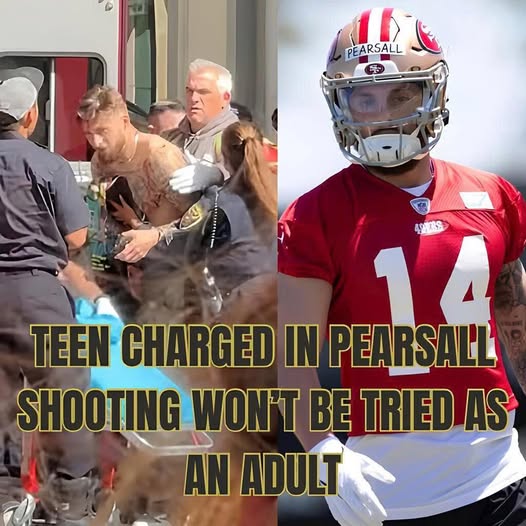BAY AREA SHOCKER: Teen Suspect in Ricky Pearsall Shooting to Avoid Adult Trial, Stirring Public Outcry and Legal Debate
San Francisco, CA — In a dramatic turn of events that has ignited widespread outrage and debate across the Bay Area and beyond, a local juvenile court has ruled that the teenager accused in the shooting of San Francisco 49ers wide receiver Ricky Pearsall will not be tried as an adult—a decision that is being hailed by some as a victory for juvenile justice, but condemned by many others as a glaring failure of the legal system.
The Shooting That Shook the Sports World
The case began earlier this year when Ricky Pearsall, a rising star and fan favorite in the 49ers’ receiving corps, was shot during what authorities described as a targeted robbery attempt outside a downtown San Jose restaurant. Pearsall, 24, sustained serious but non-life-threatening injuries. He has since made a steady recovery and has returned to training with the team, but the incident cast a long shadow over the Bay Area sports community.
Shortly after the shooting, a 17-year-old male—whose name remains withheld due to juvenile protections—was arrested and charged in connection with the incident. The charges included attempted murder, assault with a deadly weapon, and armed robbery.
The Court’s Controversial Decision
This week, the Santa Clara County Juvenile Court announced that after a series of closed-door hearings and psychological evaluations, the accused teen will remain in the juvenile justice system and will not face trial in adult court.
The judge cited the suspect’s age, lack of prior criminal history, and what was described in court documents as “a potential for rehabilitation” as reasons for keeping the case in the juvenile system.
The ruling means that if convicted, the teen could be held only until the age of 25, and not face the decades-long sentence that an adult trial might have imposed.
Public Backlash and Fan Outrage
The ruling has sent shockwaves through the Bay Area. Social media platforms erupted within minutes of the decision, with fans, public figures, and even former players weighing in.
“This isn’t justice,” wrote one 49ers season ticket holder on X (formerly Twitter). “Ricky Pearsall almost lost his life. How is a 17-year-old who brought a gun and pulled the trigger not being treated like an adult?”
Former 49ers safety Donte Whitner also shared his reaction: “This isn’t about vengeance. It’s about accountability. You pull a trigger and change someone’s life forever—you should face the consequences, not a slap on the wrist.”
Legal Experts Divided
The decision has not only triggered emotional reactions—it has also sparked a heated debate within legal circles.
“This case presents a difficult legal and moral question,” said Professor Elena Mendez, a criminal law scholar at UC Berkeley. “We have a system designed to rehabilitate juveniles, not punish them like adults. But when a violent crime affects a public figure and involves a firearm, public expectations for justice become much more demanding.”
Other experts pointed to recent studies showing that adolescents’ brains are still developing, and that the potential for rehabilitation should not be dismissed even in serious crimes. Still, they acknowledged that public perception of justice in high-profile cases often clashes with these legal principles.
Questions About Victim Input
While Pearsall has largely stayed out of the spotlight during the legal proceedings, sources close to the 49ers organization confirmed that he was not consulted directly in the final ruling on whether the case should be moved to adult court.
Victim advocacy groups have raised concerns that the decision was made without giving Pearsall a proper voice in the process. “This is a textbook example of how victims can be sidelined in the justice system,” said Marla Jenkins, a spokesperson for California Victims First. “High-profile or not, he deserved to be heard.”
What Happens Next
The suspect remains in juvenile custody and is expected to go to trial within the next few months. If convicted, he would be sentenced under California juvenile law, which could see him released at 25.
Meanwhile, Ricky Pearsall is continuing his recovery and training with the team. He has not issued a formal statement on the court’s decision, but sources close to him say he is “deeply disappointed.”
Nationwide Debate Reignited
This case has once again brought into focus the larger national debate over how violent crimes committed by minors should be prosecuted. In recent years, many states—including California—have leaned toward reforming juvenile justice, aiming to reduce the number of minors tried as adults. But critics argue that violent crimes should be treated with equal gravity, regardless of the offender’s age.
With election season around the corner, it’s likely this case will become a flashpoint in local and statewide politics, with candidates on both sides using it to argue for either tougher-on-crime policies or deeper criminal justice reform.
Conclusion
The court’s decision to try the teenager accused of shooting Ricky Pearsall as a juvenile has left a community—and a nation—grappling with difficult questions about justice, accountability, and rehabilitation. As the legal process continues, the spotlight remains fixed on how society chooses to balance mercy with responsibility, especially when high-profile figures and violent acts collide.

Leave a Reply